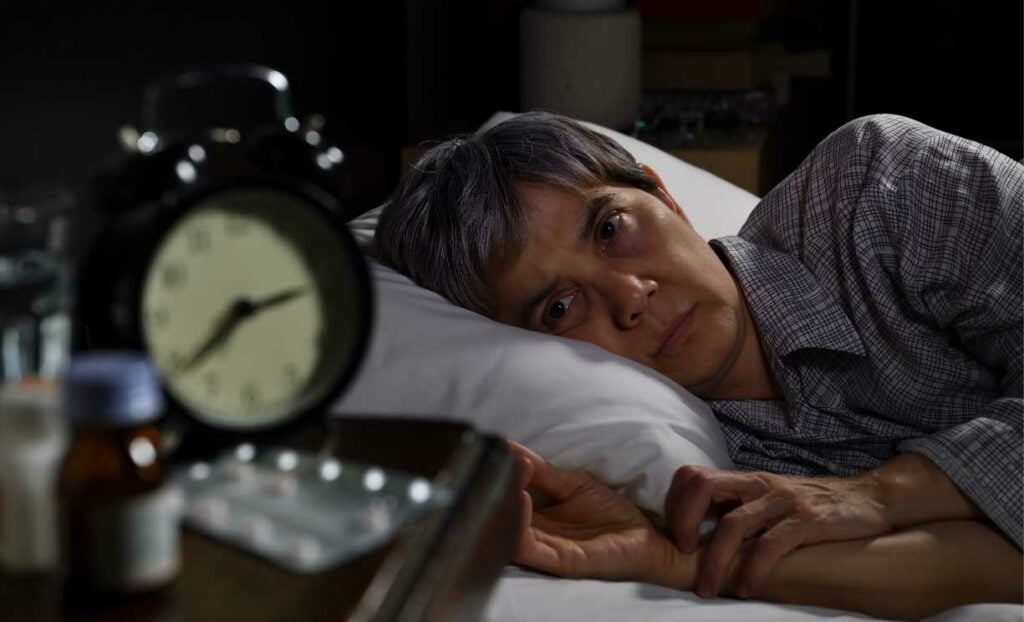As women approach the significant life transition of menopause, they often encounter a variety of symptoms, and one of the most challenging is insomnia. Menopause-related insomnia can disrupt sleep patterns and impact overall well-being. In this blog, we’ll explore the causes of menopause insomnia and delve into effective treatment options to help women find restful sleep during this transformative phase.
Contents
Can Menopause Cause Insomnia?
Yes, menopause can cause insomnia. Insomnia, or difficulty sleeping, is a common symptom experienced by many women during the menopausal transition. The hormonal changes associated with menopause can disrupt the body’s natural sleep-wake cycle. These hormonal fluctuations can lead to difficulties falling asleep, staying asleep, or experiencing restorative sleep.
The hormonal shifts during menopause also impact neurotransmitters in the brain, including serotonin, which plays a role in regulating mood and sleep. These changes can contribute to mood swings and heightened stress, further affecting sleep quality.
Why Does Menopause Cause Insomnia?
Menopause can cause insomnia primarily due to hormonal changes that occur during this natural life transition. As women age and approach menopause, the ovaries gradually produce less estrogen and progesterone. These hormonal fluctuations affect the body’s internal clock, or circadian rhythm, which regulates the sleep-wake cycle. Estrogen plays a role in promoting deep, restorative sleep, and its decline can lead to difficulties falling asleep and staying asleep.
Additionally, menopausal symptoms like hot flashes and night sweats can further disrupt sleep patterns. Hormonal changes also influence neurotransmitters in the brain, such as serotonin, impacting mood and contributing to sleep disturbances. The combination of these factors can result in menopause-induced insomnia, making it challenging for women to enjoy restful and uninterrupted sleep during this phase of life.
How Long Does Menopause Insomnia Last?
The duration for insomnia during menopause varies for each woman, but it commonly occurs during the transition into menopause and may last for several years. Menopause typically begins in the late 40s or early 50s, and insomnia often accompanies hormonal changes during this period. While some women may experience only a few months of disrupted sleep, others may grapple with insomnia for a more extended period.
Factors such as genetics, overall health, and lifestyle choices can influence the duration of menopause insomnia. It’s essential for women experiencing persistent sleep disturbances to seek guidance from healthcare professionals who can provide personalized strategies and support to improve sleep quality during this transformative phase of life.
Treatment Of Insomnia During Menopause?
Treatment of insomnia during menopause involves a combination of medical interventions, lifestyle adjustments, and behavioral strategies. Here are various approaches to address menopause-related insomnia:
- Hormone Replacement Therapy (HRT): HRT involves supplementing the body with hormones like estrogen and progesterone to alleviate menopausal symptoms, including insomnia. However, the decision to pursue HRT should be made in consultation with a healthcare professional, considering individual health factors.
- Non-Hormonal Medications: Certain medications, such as selective serotonin reuptake inhibitors (SSRIs) or gabapentin, may be prescribed to target insomnia symptoms. These medications work on neurotransmitters and can help improve sleep quality.
- Cognitive Behavioral Therapy for Insomnia (CBT-I): CBT-I is a structured therapeutic approach that addresses negative thought patterns and behaviors associated with insomnia. It helps individuals develop healthier sleep habits and manage stress related to sleep.
- Sleep Hygiene Practices: Adopting good sleep hygiene habits is crucial. This includes maintaining a consistent sleep schedule, creating a comfortable sleep environment (cool, dark, and quiet), and avoiding stimulating activities close to bedtime.
- Regular Exercise: Engaging in regular physical activity can positively impact sleep. However, it’s advisable to avoid vigorous exercise close to bedtime.
- Relaxation Techniques: Incorporating relaxation techniques, such as deep breathing exercises, progressive muscle relaxation, or meditation, can help calm the mind and promote better sleep.
- Herbal Supplements: Some women find relief with herbal supplements like valerian root or chamomile. It’s essential to consult with a healthcare professional before incorporating supplements into one’s routine.
- Acupuncture: Acupuncture, an ancient Chinese practice involving thin needles inserted into specific points on the body, has been reported by some to improve sleep quality during menopause.
Natural Remedies To Treat Menopause Insomnia
Natural remedies can be effective in managing menopause insomnia and promoting better sleep. Here are some natural approaches that may help:
- Herbal Teas: Chamomile and valerian root teas are known for their calming properties. Enjoying a cup before bedtime may promote relaxation and improve sleep quality.
- Magnesium Supplements: Magnesium is a mineral that plays a role in muscle relaxation and sleep regulation. Consider taking a magnesium supplement, but consult with a healthcare professional before adding any new supplements to your routine.
- Melatonin: Melatonin is a hormone that regulates sleep-wake cycles. Taking a melatonin supplement may help reset the body’s internal clock and improve sleep onset. Start with a low dose and consult with a healthcare professional.
- Aromatherapy: Essential oils like lavender have calming properties. Diffusing lavender oil in the bedroom or using it as part of a bedtime routine may promote relaxation.
- Regular Exercise: Engage in regular physical activity, such as walking, yoga, or swimming. Exercise can help reduce stress and promote better sleep, but avoid vigorous activities close to bedtime.
- Limit Caffeine and Alcohol: Reduce or eliminate the intake of caffeine and alcohol, especially in the hours leading up to bedtime. These substances can disrupt sleep patterns.
- Create a Relaxing Bedtime Routine: Establish a calming routine before bedtime. This could include reading or taking a warm bath to signal to your body that it’s time to wind down.
- Maintain a Consistent Sleep Schedule: Go to bed and wake up at the same time every day, even on weekends. Consistency reinforces the body’s natural sleep-wake cycle.
- Limit Screen Time: Reduce exposure to electronic devices with screens (phones, tablets, computers) at least an hour before bedtime. The blue light emitted by screens can interfere with the production of the sleep hormone melatonin.
When To Consult A Professional?
Consulting a healthcare professional is advisable when menopause symptoms, including insomnia, significantly impact daily life and well-being. Here are situations when it’s appropriate to seek professional guidance:
- Persistent Sleep Disturbances: If menopause-related insomnia persists for an extended period, affecting your ability to function during the day, it’s time to consult a healthcare professional.
- Impact on Quality of Life: When insomnia starts affecting your overall quality of life, including mood, energy levels, and daily activities, seeking professional help becomes crucial.
- Unmanageable Stress and Anxiety: If insomnia contributes to increased stress, anxiety, or feelings of being overwhelmed, a healthcare professional can provide guidance on managing these emotional aspects.
- Health Concerns: If insomnia is accompanied by other health concerns or if you have existing health conditions, consulting a healthcare professional ensures a comprehensive assessment and appropriate management.
- Persistent Mood Changes: Changes in mood, such as irritability or persistent low mood, associated with insomnia may warrant professional attention for a holistic approach to well-being.
- Ineffectiveness of Self-Care Strategies: If self-care strategies and lifestyle adjustments fail to improve sleep, a healthcare professional can offer more targeted interventions, including medical treatments or therapy.
- Impact on Relationships: If insomnia affects your relationships or if your partner observes significant changes in your sleep patterns, it may be time to involve a healthcare professional.
Remember, healthcare professionals can offer personalized guidance, recommend treatments, and help improve overall sleep quality. Seeking professional help ensures a comprehensive approach to managing menopause-related symptoms and promoting overall well-being.
Conclusion
In conclusion, the treatment of menopause-related insomnia requires a multifaceted approach that considers the unique challenges posed by hormonal changes during this transitional phase. From hormone replacement therapy to non-pharmacological interventions like cognitive-behavioral therapy for insomnia (CBT-I) and adopting healthy sleep hygiene practices, there are diverse avenues for managing and improving sleep quality.
With a combination of personalized strategies, women navigating menopause can reclaim restful nights, ensuring a healthier and more rejuvenated approach.
If you are facing PCOS related issues, pcos treatment at HerMantra can help. Book your free trial online pcos treatment session now.






I was studying some of your content on this internet site and I believe this internet site is really instructive!
Keep on putting up.Raise blog range